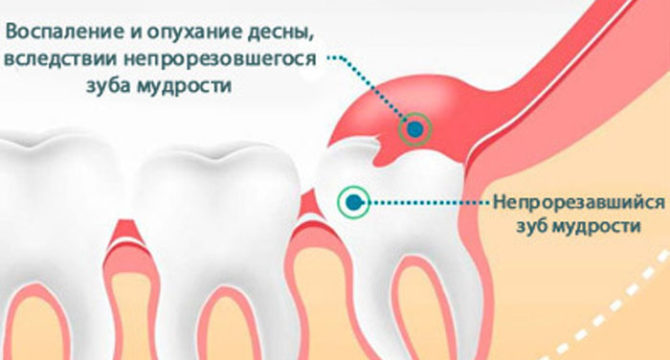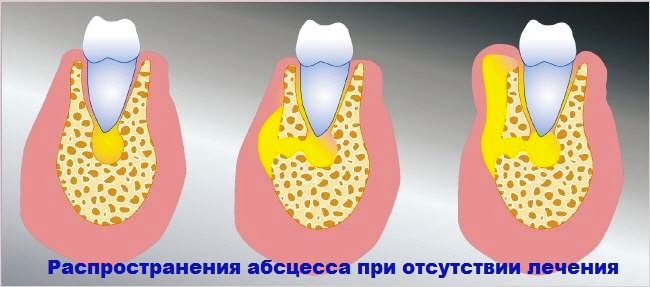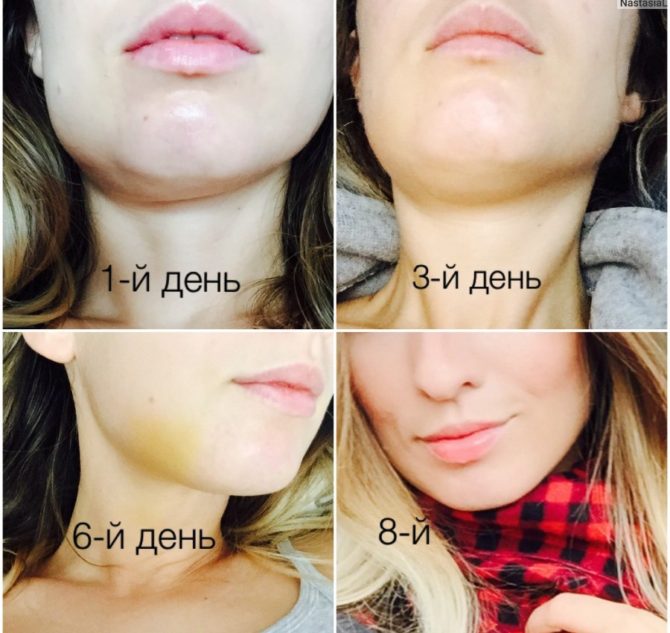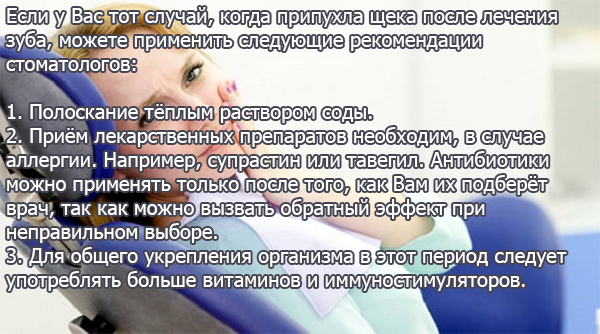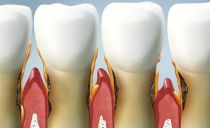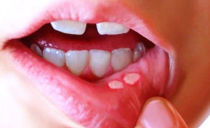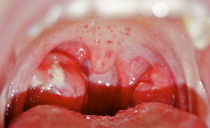Swollen cheek: causes of swelling of the cheek, how to remove a tumor, swollen cheek without toothache
Many causes can cause swelling of the cheeks. When such a phenomenon occurs, there is no need to panic right away. You should calmly assess your condition, analyze when edema has occurred, whether pain syndrome and other related manifestations are present.
Puffiness - an occasion to consult a dentist, which will determine why the cheek is swollen near the tooth and tells how to remove the tumor.
Content
Causes of swelling with pain
If the swelling of the cheek is accompanied by pain, the causes may be as follows:
- Inflammatory processes of the periodontium. In this case, both cheeks can become inflamed, but the most pronounced tumor occurs in one area affected by the infection.
- In some cases, when the cheek is swollen, the causes of this phenomenon may lie in poor-quality filling of the root canals, neglected condition of the teeth. Often, buccal swelling is preceded by tooth pain. The focus of inflammation is localized in the region of the lower or upper jaw and is adjacent to the root of the dental unit. After a few days a flux may occur, later transforming into an abscess, an abscess.
- Impaired wisdom tooth growth. Initially, swelling may occur in the area where these teeth are located. At this point, a hood from the mucosa appears, where food particles can accumulate, as a result of which the mucosa is irritated and inflamed. Bruising pain, gum swelling, and buccal swelling occur. If the tooth is partially erupted, it can constantly injure the mucous membrane inside (when talking, eating), which provokes a slight inflammation on the cheek, which swells even more.
- The inflammatory process after removal of the dental unit. Often, this phenomenon is the norm, because the dentist, tearing out a tooth, mechanically injures the tissue around it.
With improper hygiene in the postoperative period, infection of the hole may occur, which leads not only to pain, buccal swelling, but also to more serious consequences.
- Cyst formation. A tooth tumor develops a certain time (up to 2 years), subsequently, a neoplasm can affect the periosteum. The disease is accompanied by sharp pain in the affected tooth, swelling and soreness of the buccal region.
The cheek and gums are swollen, and the tooth does not hurt
When a person has gum and cheek swollen, but the tooth does not hurt, the causes of this phenomenon may be:
- Allergy. It can occur as a reaction to the use of certain dental materials, manifesting some time after filling, prosthetics. When the cheek is swollen, but the tooth does not hurt, the allergen may not be related to dental surgery. In this case, the edema is able to spread not only to the cheek, but also to the nose, eyes, "creep" to the lip, affect the entire face.
- Nerve removal. The process occurs due to the individual characteristics of the patient: the presence of complex branches of the channels where a small part of the nerve may remain. In this case, after filling, swelling may occur without pain.
- Torn tooth, gum dissection. When carrying out such operations, edema is a natural phenomenon. It can persist for a week and at first (1-2 postoperative days) it is accompanied by moderate pain syndrome (in the region of the socket) and swelling.In this case, the situation when the cheek is swollen, but the tooth does not hurt, is the norm.
- Infectious diseases. Often the buccal region can swell in the absence of pain. A similar condition occurs with infectious inflammation of the lymph nodes in a child. Infectious lesions are accompanied by high temperature indicators, aches.
In case of serious diseases of the internal organs, the outflow of fluid is possible, as a result of which it accumulates in the cheeks, cheekbones, neck, near the eyes, nose.
- Pathologies of a neurological nature. These diseases are accompanied not only by swelling, but also by congestion in the ears, pain in the parotid region, sore throat (it is painful to speak, swallow), sensations of aching in the face.
- Injury, injury. In most cases, injuries and bruises are accompanied by swelling of the soft tissues. With the elimination of the pain syndrome or its initial absence, the swelling persists.
When the tooth does not hurt, and the cheek is swollen, it is necessary to think what to do after a calm analysis of one’s own condition and assessment of the accompanying symptoms.
Situations when edema does not threaten health
To find out why the cheek is swollen, but nothing hurts, you need to go to the doctor. If this happens after tooth extraction, you don’t need to worry. The swelling of the cheeks can cause the following reasons:
- The presence of edema before surgery.
- Extraction against the background of a pronounced inflammatory process.
- Complex operations in the oral cavity. Long-term surgical interventions, which are complex multi-stage processes: removal of a wisdom tooth, bone cutting, lead to severe injury to the tissues around. Periodontium, subjected to mechanical damage, can become inflamed, reacts with edema, which spreads to the buccal region.
- The presence of certain diseases that contribute to the occurrence of swelling after surgery: hypertension, neurological disorders. With such pathologies, the situation when the cheek is swollen, and the tooth does not hurt, is a frequent phenomenon.
- When gingival tissue is inflamed. In this case, a gum incision is made, which provokes buccal edema. If there is an abscess, flux before the tooth is removed, the dentist dissects the gum tissue to give an outflow of pus. As a result, the tissue swells, the tumor spreads further.
Normally, the condition when, after surgery, the cheek is swollen, lasts no more than a week. Swelling of the buccal region after extraction decreases gradually and passes certain stages:
- A few hours after the operation, and sometimes on the first day, there may be swelling with moderate pain or with no pain.
- On the third postoperative day, the tumor reaches its maximum size, there is a feeling that the cheek is puffed out. In the following days, puffiness decreases, it disappears by 7-8 days.
Treatment of edema of the buccal region
If a swelling of the buccal area occurs, you should immediately consult a doctor. In dentistry, based on diagnostic measures, a specialist will say how to relieve swelling of the cheek, how to treat this condition and eliminate possible complications. An exception may be the period after tooth extraction, when the swelling does not disappear immediately, but after a week.
If the patient has a swollen cheek, but nothing hurts, a detailed diagnosis is carried out to determine the cause of the phenomenon.
A false sensation may occur, as if the cheek was swelling from the tooth. This condition is often manifested in neurological diseases.
Sometimes soreness and swelling are not associated with dental problems, although pain is localized precisely in the jaw area. In this case, the patient is referred to a neurologist. In addition, edema without pain can be caused by serious hormonal disorders, then it is necessary to consult and be treated by an endocrinologist.
The condition why the cheek is swollen and the tooth does not hurt is examined by the dentist, as a result of which the medical direction is determined. In the presence of severe pain, when swelling of the cheek occurs with severe toothache, surgery is possible. Such symptoms are characteristic of cystic neoplasms, pulpitis, requiring immediate medical attention. If an inflammatory process occurs, a course of antibiotics can be prescribed.
Treatment of inflammation on the cheek at home
In a situation where the gum and cheek are swollen, something needs to be done to alleviate the condition before visiting a specialist. You can remove pain and swelling at home by the following means:
 Rinsing the mouth with herbal decoctions and solutions of natural ingredients. Brewed flowers of calendula, chamomile, sage broth, have a pronounced anti-inflammatory, soothing and cleansing effect. It is necessary to take 2 tablespoons of flowers, pour 1 cup of boiling water, leave for 15 minutes. It is necessary to rinse the oral cavity 2 times a day, you can moisten a piece of cotton wool and apply from the inside.
Rinsing the mouth with herbal decoctions and solutions of natural ingredients. Brewed flowers of calendula, chamomile, sage broth, have a pronounced anti-inflammatory, soothing and cleansing effect. It is necessary to take 2 tablespoons of flowers, pour 1 cup of boiling water, leave for 15 minutes. It is necessary to rinse the oral cavity 2 times a day, you can moisten a piece of cotton wool and apply from the inside.- When the cheek is swollen, the use of solutions with soda or salt is effective. Solutions help to remove the swelling, have analgesic and antiseptic effects. You can make a solution like this: one teaspoon of salt or soda should be added to a glass of warm water and mixed. Rinse the oral cavity several times a day.
- Cooling, decongestant ointments and gels. These drugs effectively relieve swelling and eliminate pain. Among the most common - Troxevasin, Fastum gel. Means are gently rubbed into the affected area. The procedure is repeated 2-3 times a day. The most effective use of drugs to relieve edema in case of allergic reactions and in cases when the teeth are cut in babies.
- Rinse with pharmacy antiseptics. Antibacterial drugs that have a healing and regenerating effect are always effective when the cheek is swollen, regardless of the cause of the tumor. Therefore, their wide distribution is justified. Popular antiseptics include: furatsilin, chlorhexidine, hydrogen peroxide.
If Furacilin is bought in tablets, the solution is done on its own: one tablet must be dissolved in 100 ml of hot water. The tool is held in the mouth mainly from the side of the edema, then spits out. The procedure is repeated 3 times a day.
Rinse the oral cavity with chlorhexidine twice a day. Hydrogen peroxide is diluted with water in proportions of 1 to 1. Rinses should be repeated twice a day.
Prevention
Regardless of why the cheek is swollen and what are the causes of its edema, it is necessary to follow simple rules that prevent diseases of the oral cavity. Basic preventive measures:
- Compliance with hygiene procedures of the oral cavity. It is necessary to brush your teeth at least 10 minutes 2 times a day. It is worth using dental floss to remove food debris, plaque. Remove plaque as carefully as possible, it creates an optimal environment for the propagation of pathogenic microbes.
- Regular visits to the dentist. A visit to a specialist will help prevent many diseases, identify existing problems, and avoid complications. The dentist will conduct a professional examination of the oral cavity, professional brushing. If necessary, a complex of therapeutic measures will be prescribed.
- A balanced and balanced diet. A full-fledged diet strengthens the body, ensures its saturation with the necessary elements, which in the most beneficial way affects the health of teeth and gums. Increases resistance to harmful microorganisms, the ability to restore soft and bone tissues.
- The use of vitamin complexes that restore the balance of nutrients and elements, making up for their shortage.
- Physical exercise.Physical activity improves the general condition of the body, strengthens the immune system, enhances metabolic processes, improves the functioning of all systems.
- Healthy psycho-emotional background. Many unpleasant symptoms occur against the background of psychoemotional disorders, including neurological pain and swelling in the face.
- Regular visits to the therapist will help to cure diseases that provoke inflammatory processes in the oral cavity, disorders of the regenerative ability of bone tissue, and dental problems.
The condition when there is swelling of the buccal region can be caused by a number of reasons. You must contact your doctor immediately to find out and eliminate the factor that triggered the swelling and prevent possible complications.


